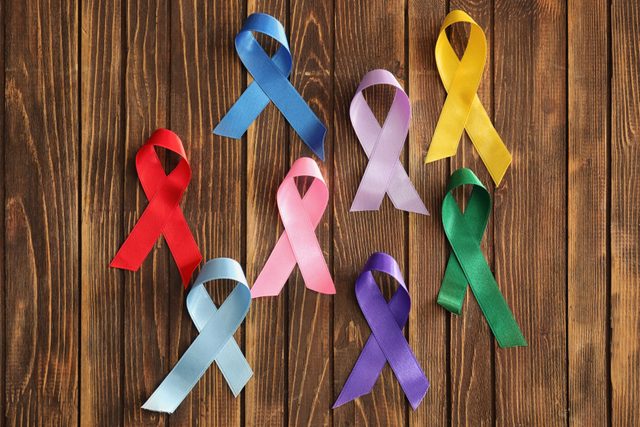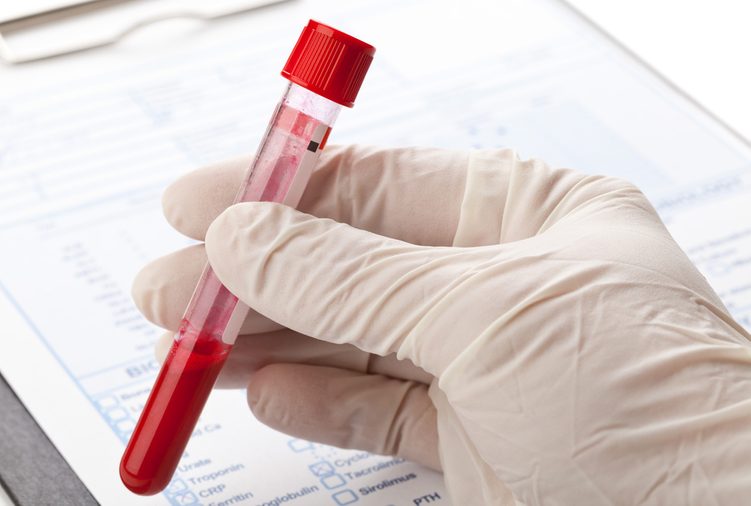
Common cancer warning signs and symptoms
Cancer is the number two killer in the United States, according to the Centers for Disease Control and Prevention, which is why it’s so important to catch it early. The telltale warning signs of cancer go beyond lumps and bumps. Here are the other symptoms that doctors should not ignore that could signal cancer in the body.

Blood
Blood is rarely a good thing unless you know where it’s coming from (a cut or scrape, for example). If you’re seeing blood and aren’t sure why—whether it’s in your mucus or from a cough—make an appointment with your doctor. “This can be blood in urine, blood in bowels, vaginal bleeding after menopause, or coughing up blood,” says Martha K. Terris, MD, the Witherington Distinguished Professor and chair at the Medical College of Georgia in Augusta University. Women, whether or not they’ve been through menopause, also shouldn’t ignore unexplained bleeding.

Recurrent pneumonia
Chronic issues are your body’s way of getting your attention. “A pattern I’ve noticed is that many patients have symptoms that can be explained and improve with treatment. But they kept reoccurring without a good explanation as to why—and nobody paused to ask why this is happening,” says Mendel Goldfinger, MD, the Director of the Hemato-Oncology Montefiore Network Program and Assistant Professor at our Albert Einstein College of Medicine. “For example, a 40-year-old who never had pneumonia and all of a sudden develops pneumonia twice in a year needs to ask his or her doctor why this is now happening even if the pneumonia improves with treatment of antibiotics.”

Lumps or bumps
If you knock your shin into a coffee table, there’s a good chance you’ll see a bruise and lump crop up. But if lumps, bumps, or unusual knots are turning up and you can’t remember running into anything, be suspicious. “Lumps can involve the skin or be under the skin in the groin, armpit, neck, breasts, or abdomen,” Dr. Terris says. If they persist or come back regularly, make an appointment to see your doctor. Here are 7 things a lump in the breast could be besides breast cancer.

Fever
An unexplained fever—you don’t have an infection or virus that could be causing it—is cause for concern, especially if it reoccurs. “If you have a fever for 24 hours or 48 hours and take some Tylenol and it goes away, it is not a cancer fever,” says Ioana Bonta, MD, a medical oncologist in Atlanta, Georgia. “But a low-grade fever for a week or two weeks that doesn’t go away even if you take Tylenol or ibuprofen—that is a concerning fever.”

Unexplained weight loss
Most of us wouldn’t look this gift horse in the mouth—but that’s unwise, warns Dr. Bonta: Unexplained weight loss is never good. “Cancer secretes hormones that cause mass wasting,” she says. “Generally, people with cancer will lose weight. If you haven’t changed something—like your diet or started exercising—and you’re losing weight, it’s a problem.”

Night sweats
As with fever, night sweats are a sign your body may be in overdrive fighting cancer, a virus, or other invading cells. “Your body sees the cells as foreign and up-regulates the immune response, leading to symptoms like fever and night sweats,” Joel Warsh, MD, a holistic and integrative medicine practitioner in Studio City, California. This is especially common with people who have lymphoma or leukemia, Dr. Bonta says. “Any patient with leukemia, they’ll tell me they get up in the middle of the night and will be soaked. They have to change their bedspread and pajamas,” she says. These night sweats are different from hormone-related hot flashes, Dr. Bonta points out. “If you can identify a cause for it and treat it, it’s not cancer. But drenching night sweats are a concern for some types of cancer.”

Persistent heartburn
If you’re keeping the antacid companies in business, you may need to talk with your doctor about a stronger medicine—and the possibility of a cancerous cause. “Gastric cancer is not the most common cancer, but it’s increasing in incidence,” Dr. Bonta says. “People who have reflux or gastroesophageal reflux disease (GERD) may not realize it, but the lining of the esophagus is changing.”
With prolonged reflux, the normal, healthy cells that line the esophagus are replaced by abnormal cells that can become cancerous. This condition, called Barrett’s esophagus, can be a precursor for cancer, Dr. Bonta says. “Persistent heartburn can actually be one of the first signs of cancer, especially if that heartburn is coordinated with trouble or pain swallowing,” she says.

Mouth or tongue sores that don’t heal
Common mouth sores like canker sores or cold sores are annoying—but rarely a serious concern. Cold sores are typically caused by herpes simplex virus type 1, a highly communicable virus that’s passed when you kiss or share a cup or fork with someone who carries it. The sores can be brought on by illness, stress, or sun exposure. Canker sores are equally common, though it’s unclear why these develop. A combination of factors, including minor injury to the skin, diet deficiencies, as well as certain bacteria, may be to blame. With any mouth sore, pay attention to the duration. “If you have a persistent sore—like for a month—and it’s not going away and getting worse, this is something that needs to be checked out,” Dr. Bonta says. The sore could be a sign of skin cancer or, rarely, a head or neck cancer.

Skin lesions that change
Moles and freckles rarely grow, change color, or shift size. If you see a spot on your skin that does any of those things, you may be looking at cancer. It’s time to make an appointment with a dermatologist. “Any changing lesion needs to be seen by a dermatologist, especially in people with fair skin. They’re at high risk for melanoma,” Dr. Bonta says. “Don’t wait to see if it goes away.” She adds that it’s not only fair-skinned people that should be aware of skin cancer. “One of the worst melanoma cases I’ve seen was in a man, 20-something, from Ethiopia. He had a pretty aggressive form of melanoma on the sole of his foot.”
Also, be aware that not all melanoma will change shape or size. Spots you’ve had for years are worth checking with a dermatologist, Dr. Bonta says. “Having spots that have been there forever does not mean it’s nothing,” she says. “Often it is nothing, but you still need to be checked every year.” Don’t miss these 7 sneaky places you can get skin cancer that aren’t on your skin.

Bloating
It’s not unusual to experience bloating from time to time, especially after eating high-fiber foods you may be sensitive to, like Brussels sprouts and beans. Again—persistence is key: If bloating persists over time and doesn’t ease even though you changed your diet and tried bloating home remedies, it’s time to talk with your doctor.
“The most common symptom in ovarian cancer patients is increased abdominal pressure,” Dr. Bonta says. “They say they get very full very fast. It may be nothing because bloating is a common post-menopause symptom as well, but it’s also one of the most common symptoms of ovarian cancer,” she explains. “Ovarian cancer is called the silent killer because once we find it, it’s too late. There isn’t screening for it. That’s why you need to pay attention to symptoms.”

Irregular bowel patterns
Your bowel habits may change with what you eat, but if they’re unpredictable and troublesome, you may be seeing signs of potential cancer. “I’m worried about constipation and diarrhea, but I’m most worried about alternating between the two,” Dr. Bonta says. “Colon cancer or other GI malignancies can stop up the bowels and keep stool from moving through. That can lead to constipation. At some point, the backup will lead to diarrhea. Any constant changing, or any alternating between constipation and diarrhea, is a problem.” Here are the 6 silent symptoms of colon cancer you may be missing.

Cough
Coughing is your body’s way of clearing things that irritate the lungs. A cough with allergies or flu isn’t uncommon. However, if you have a persistent cough with no other symptoms, you may need to get screened. “If you’re a smoker and you have a cough, I wouldn’t wait three months until you see your doctor,” Dr. Bonta says. “Your risk depends on how long you’ve been smoking—the pack-years.” The term applies to the number of packs a person smoked a day multiplied by the number of years they smoked. “The higher the number of pack-years, the higher the risk of getting lung cancer.” A cough can also signal danger If you’ve been exposed to smoke, chemicals, or other potential carcinogens, either from your home or work environment.

Lesions on the genitals
While this is most commonly a sign of sexually transmitted diseases, lesions on a vagina or penis may also be a symptom of cancer. “HPV (human papillomavirus) can manifest itself as warts,” Dr. Bonta says. The virus can also cause cervical cancer, which is why a regular Pap smear is so important for women—every three years for healthy women under 30, and every five years for women older than 30 (though you should discuss this with your doctor). Another concern, according to Dr. Bonta: Head and neck cancer cases are on the rise because of HPV infections from oral intercourse. “Yes, you can still get HPV from oral intercourse,” she says.

Frequent urination
“Prostate cancer is the second most commonly diagnosed cancer among men in the U.S.,” says Vahan Kassabian, MD, a urologic oncologist at Advanced Urology in Atlanta, Georgia. (Skin cancer is number one.) “Most men are diagnosed with an early stage of the disease, which typically has no noticeable symptoms.”
However, Dr. Kassabian says, some prostate cancers will spread locally, and that can lead to symptoms. “Men with locally advanced prostate cancer may experience urinary symptoms, such as more frequent urination or a week urinary stream,” he says. “For men with more aggressive, metastatic prostate cancer, common warning signs include fatigue, aches and pains, weakness or numbness, trouble falling or staying asleep, and difficulty doing everyday activities, such as walking up the stairs or taking out the trash.” Next, don’t miss these 50 rampant cancer myths everyone needs to stop believing.
